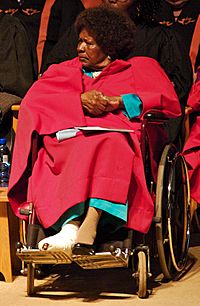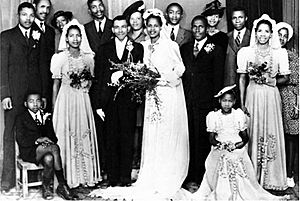Albertina Sisulu facts for kids
Quick facts for kids
Albertina Sisulu
|
|
|---|---|

The University of Johannesburg confers an honorary doctoral degree (Doctor Litterarum et Philosophiae (honoris causa)) on Albertina Sisulu in acknowledgement of her revolutionary role in pre-1994 South Africa.
|
|
| Born |
Nontsikelelo Thethiwe
21 October 1918 |
| Died | June 2, 2011 (aged 92) |
| Known for | Anti-apartheid activist |
| Spouse(s) | |
| Parent(s) | Bonilizwe and Monikazi Thethiwe |
Albertina Sisulu (born Nontsikelelo Thethiwe; 21 October 1918 – 2 June 2011) was a brave South African activist. She fought against apartheid, a system of unfair laws. People lovingly called her "Ma Sisulu." She was married to another famous activist, Walter Sisulu. Albertina Sisulu passed away in her home in Johannesburg in 2011, at 92 years old.
Contents
Early Life and Education
Albertina Sisulu was born Nontsikelelo Thethiwe on 21 October 1918. She grew up in a place called Tsomo in the Transkei, South Africa. She was the second of five children. Her mother was often sick after surviving the Spanish Flu. Because of this, Albertina, as the oldest girl, had to help take care of her younger brothers and sisters. She often missed school to help her family.
When she started school at a Presbyterian mission, she chose the name Albertina. She was a natural leader and showed great skills in school activities. She was even chosen as head girl in primary school.
After primary school, Albertina wanted to go to high school. She entered a competition for a scholarship and came in first place. However, she was disqualified because she was two years older than her classmates. Her teachers were upset by this unfair rule. They wrote to a local newspaper to argue for her.
This article caught the eye of priests at a Roman Catholic Mission. They helped her get a four-year scholarship to Mariazell College. Her family and village were so happy, they celebrated as if it were a wedding!
In 1936, she went to Mariazell College in the Eastern Cape. School life was very strict. Students woke up at 4 AM for prayers and chores. Her scholarship covered her costs, but she had to work during holidays. She ploughed fields and worked in the laundry room to pay it back.
When she finished high school in 1939, Albertina decided she wanted to work and support her family. She thought about becoming a nun, but a priest advised her against it. Nuns did not earn a salary, so she could not help her family financially. Instead, he suggested nursing, as trainee nurses were paid. She liked this idea and applied to nursing schools. In January 1940, she moved to Johannesburg to train as a nurse at a hospital for "Non-Europeans." This meant it was for people who were not white, under the apartheid system.
In 1946, Albertina Sisulu became a midwife. She often walked long distances to visit patients in townships. She once said, "You know what it means to be a midwife? You have got to carry a big suitcase full of bottles... and we used to carry those suitcases on our heads."
Joining the Fight Against Apartheid
Albertina Sisulu did not start out interested in politics. She would go to political meetings with her husband, Walter, to support him. But soon, she became deeply involved in the fight against apartheid.
In 1948, she joined the African National Congress (ANC) Women's League. She also helped launch the Freedom Charter that same year. This important document outlined what a fair and free South Africa should look like. She was the only woman present when the ANC Youth League was formed. In 1954, she became a leader in the Federation of South African Women.
On 9 August 1956, Albertina Sisulu took part in a huge march. She joined Helen Joseph and Sophia Williams-De Bruyn and 20,000 other women. They marched to the Union Buildings in Pretoria. They were protesting against the apartheid government's pass laws. These laws forced Black South African women to carry passbooks. Albertina said, "We said, 'nothing doing'. We are not going to carry passes and never will do so." This day is now celebrated as National Women's Day in South Africa.
Albertina was arrested and spent three weeks in jail for protesting the pass laws. Nelson Mandela was her lawyer, and she was found not guilty. She also opposed Bantu education, which was a poor education system for Black children. She even ran schools from her own home to help children get a better education.
In 1963, Albertina Sisulu was arrested again. This happened after her husband, Walter, went into hiding from the police. She was the first woman arrested under a new law. This law allowed the police to hold people for 90 days without charging them. Albertina was kept alone in jail for almost two months.
Even though she was often in and out of jail, she kept fighting apartheid. She was also banned from many activities during the 1960s. This meant she could not attend meetings or be with more than a few people at a time. In the 1980s, she became a co-president of the United Democratic Front (UDF).
From 1984 to 1989, she worked for a doctor in Soweto, Abu Baker Asvat. He allowed her to continue her political work. She was present when he was sadly murdered.
In 1989, Albertina Sisulu finally got a passport. She led a UDF group overseas. She met British Prime Minister Margaret Thatcher and US President George H. W. Bush. In London, she spoke at a big anti-apartheid rally. This protest was against the visit of National Party leader F. W. de Klerk.
In 1994, South Africa held its first democratic election. Albertina Sisulu was elected to the new Parliament. She served until 1998. At the very first meeting of this Parliament, she had the great honor of nominating Nelson Mandela to be President of South Africa. That year, President Mandela gave her an award.
Community Work and Legacy
For over 50 years, Albertina Sisulu dedicated herself to the Albertina Sisulu Foundation. This foundation helps young children and older people. She was honored for her work when the World Peace Council elected her president from 1993 to 1996.
She also helped nurses from South Africa go to Tanzania. They replaced British nurses who left after Tanzania became independent. The South African nurses had to be secretly moved out of South Africa to Botswana. From there, they flew to Tanzania.
The Albertina Sisulu Multipurpose Resource Centre/ASC was also founded by Sisulu. It helps the community in many ways:
- A school for children with special needs.
- A center for very young children (Early Childhood Development).
- A program for young people with disabilities to learn skills for jobs.
- A food program for people in need.
- A community hall for various activities.
- An outreach program to help more people.
Weeks before she passed away, Albertina Sisulu and Nelson Mandela opened the Walter Sisulu Paediatric Cardiac Centre for Africa in Johannesburg. This center was named after her late husband. She became a trustee and helped raise money for it.
Family Life
Albertina Sisulu met Walter Sisulu in 1941 when she was working at Johannesburg General Hospital. He was a young political activist. They got married in 1944. Nelson Mandela was Walter's best man at their wedding.
They had five children: Max Sisulu, Zwelakhe Sisulu, Mlungisi Sisulu, Lindiwe Sisulu, and Nonkululeko Sisulu. They also adopted four other children, including Samuel Sisulu. Their adopted daughter, Beryl Rose Sisulu, later became South Africa's ambassador to Norway.
Albertina and Walter were married for 59 years. Walter passed away in 2003 at the age of 90, in his wife's arms. Albertina once said about her marriage, "I was told that I was marrying a politician and there was no courtship or anything like that." But at his funeral, their granddaughter read a touching message from Albertina: "Walter, what do I do without you? It was for you who I woke up in the morning, it was for you who I lived... Now the cold hand of death has taken you and left a void in my heart."
Walter Sisulu was found guilty of treason and sabotage. He spent 25 years in prison on Robben Island with Nelson Mandela. While Walter was in prison, Albertina raised their five children alone. She also faced many restrictions on her own movements.
Albertina worked hard to send her children to good schools outside the unfair Bantu Education System. Many of the Sisulu children have become leaders in democratic South Africa. Max Sisulu was the speaker in the National Assembly. Lindiwe Sisulu was a minister in the government. Zwelakhe was a well-known businessman. Their daughter-in-law, Elinor Sisulu, is a famous author and human rights activist.
Important Words
In 1987, Albertina Sisulu spoke about the power of women in Soweto: "Women are the people who are going to relieve us from all this oppression and depression. The rent boycott that is happening in Soweto now is alive because of the women. It is the women who are on the street committees educating the people to stand up and protect each other."
Passing Away
Albertina Sisulu passed away suddenly at her home in Johannesburg on 2 June 2011. She was 92 years old. She was watching television with her grandchildren when she suddenly became ill. Paramedics tried to help her, but they could not revive her.
At the time of her death, she was survived by her five children, her adopted niece and nephew, and many grandchildren and great-grandchildren. Her family said they were sad but comforted. They knew she was reunited with her beloved husband, Walter.
President Jacob Zuma honored Albertina Sisulu. He said she was "a pillar of strength" for her family and the entire freedom movement. He added that she "reared, counselled, nursed and educated most of the leaders and founders of the democratic SA." President Zuma announced that Albertina Sisulu would receive a state funeral. National flags were flown at half-mast to honor her.
Positions Held
Albertina Sisulu held many important roles:
- She became a national co-president of the United Democratic Front in 1983.
- She joined the ANC Women's League and was elected deputy president.
- In 1994, she became a Member of Parliament. She retired in 1998.
- She was a member of the Federation of South African Women from 1954 to 2011.
- She was the Treasurer of the ANC Women's League from 1959 to 1990.
Honors and Tributes
Roads Named After Her
In 2013, a section of the R24 Route in Gauteng, South Africa, was named after Albertina Sisulu. This road goes from OR Tambo International Airport through Johannesburg to Krugersdorp East. The highway part is called the Albertina Sisulu Freeway. The non-highway part is called Albertina Sisulu Road.
Also, a part of the R21 e-toll Highway in Gauteng is often called the Albertina Sisulu Freeway. This section goes from OR Tambo International Airport to the N1 Highway in Pretoria. This means the R21 from Pretoria to the airport and the R24 from there to Bedfordview are together known as the Albertina Sisulu Freeway.
Bridge Named After Her
On 23 October 2014, the city council of Ghent, Belgium, decided to name a new bridge after Albertina Sisulu. This bridge is for people walking and cycling over the Scheldt river. It is called the "Albertina Sisulubrug" (Albertina Sisulu Bridge). It connects the new city library to the Kuiperskaai.
See also
 In Spanish: Albertina Sisulu para niños
In Spanish: Albertina Sisulu para niños
Images for kids
 | Janet Taylor Pickett |
 | Synthia Saint James |
 | Howardena Pindell |
 | Faith Ringgold |



